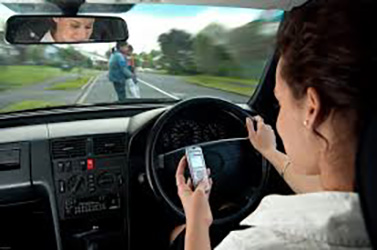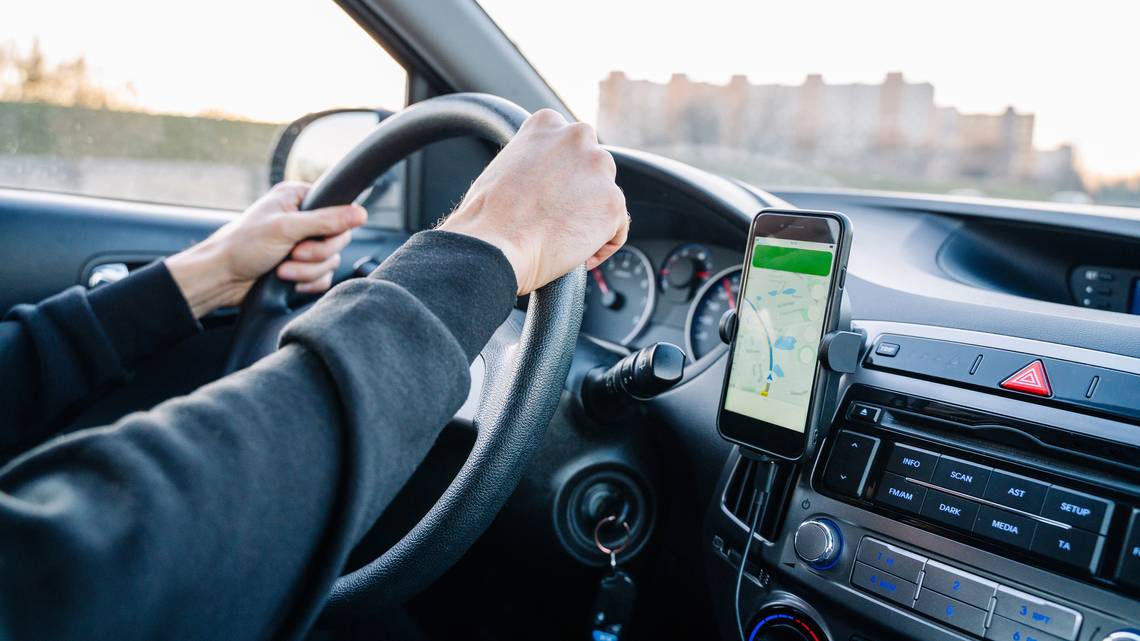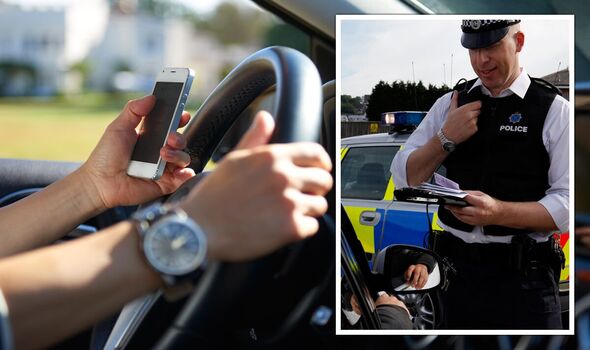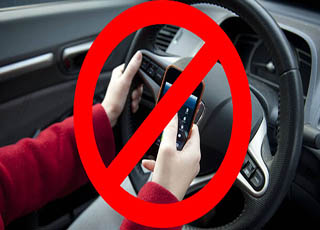The use of handheld mobile phones while driving has long been a contentious and hazardous issue for drivers in the UK. As of March 25, 2022, motorists are in violation of the law if they use a handheld mobile phone while driving for any purpose.
 This prohibition includes activities such as taking photos or videos, scrolling through music playlists, using streaming services, or playing games. This action addresses a loophole previously exploited by reckless drivers to avoid prosecution.
This prohibition includes activities such as taking photos or videos, scrolling through music playlists, using streaming services, or playing games. This action addresses a loophole previously exploited by reckless drivers to avoid prosecution.
Grant Shapps, the Transport Secretary, affirmed, “I will do everything possible to ensure the safety of road users. That’s why I’m adopting a zero-tolerance approach to those who risk lives by using their phone while driving.” He emphasised the importance of enforcing consequences for breaking this crucial law to maintain road safety.
According to our 2020 Report on Motoring, nearly a third of Britain’s 40 million drivers, approximately 13 million individuals, identify handheld mobile phone use by other drivers as one of their top concerns. However, due to increased media coverage and lobbying efforts by the RAC, dangerous loopholes related to phone use while driving have recently been addressed.
What Are the Laws Regarding Mobile Phone Use While Driving?
Following recent legislative updates, it is illegal to hold and use a phone, satellite navigation system, tablet, or any handheld device capable of sending or receiving data while driving or riding a motorcycle.
For drivers in the UK, this means refraining from using a handheld device for any purpose. The law remains applicable even if a driver is stationary at traffic lights, stuck in traffic, supervising a learner driver, or operating a car equipped with a start/stop engine while stationary. Drivers must never use a handheld device while driving, even if it is offline or in flight mode.
Violators of the law may face up to 6 penalty points on their licence and a £200 fine. Additionally, drivers who obtained their licence within the last 2 years risk losing it. If a driver fails to maintain a full view of the road and traffic ahead or proper control of the vehicle while using a handheld device, they may incur an additional 3 penalty points. Offenders may be prosecuted in court, where they could be banned from driving and fined up to £1,000, or up to £2,500 for lorry or bus drivers.
Hands-Free Phone Use: Legal Regulations
Two important points to remember are:

Holding your phone while driving, even momentarily, is prohibited (this includes supervising a learner driver).
Hands-free access is required to use your phone for communication.
Hands-free devices should be set up before driving to enable making calls without handling the device. These devices must not obstruct the driver’s view of the road. In an August 2019 report, the Commons Transport Committee advocated for banning the use of hands-free kits, citing similar collision risks as handheld phones. Despite this, the government currently has no plans to implement such a ban. The police retain the authority to stop drivers suspected of being distracted by using a mobile phone while driving, even if it is hands-free.
Some road safety organisations propose turning off mobile phones completely while driving to eliminate distractions.
Using a Phone as a Satellite Navigation System: Legal Regulations
Using a phone for navigation purposes does not justify holding it while driving. To use a navigation app, drivers should mount the phone on the windscreen or dashboard, ensuring clear visibility without the need for holding or interacting with it.
When Can You Use a Phone in Your Vehicle?
The law specifies that using a handheld device while driving is only permissible when safely parked. This excludes waiting in traffic or being stationary at traffic lights. An exemption exists for emergencies: drivers may make 999 or 112 calls on a handheld device while driving if it is unsafe to stop.
Recent legislative updates allow drivers to make contactless payments in a stationary vehicle, such as at a drive-through restaurant. Additionally, with the introduction of new vehicle technologies, drivers can use a mobile phone to park their vehicle remotely.
Tracking Mileage with a Phone: Legal Considerations
Apps like Black Box Car Insurance often track journeys and mileage. Using a phone while driving is illegal, and these apps should not require interaction while driving; they should simply run in the background.
Using a Phone While Stationary: Legal Regulations
Contrary to popular belief, the law still applies when a vehicle is stationary at lights or in heavy traffic.
If the engine is running, holding a phone is prohibited. This includes instances when the engine automatically stops to conserve fuel (known as ‘start-stop technology’).
To use a phone while the vehicle is stationary, only hands-free technology should be employed.
According to the RAC Report on Motoring 2020, 42% of drivers make or receive handheld calls while their vehicle is stationary and the engine is running. This rate has increased from 39% in 2019.
While hands-free phone kits are legal in the UK, police retain the authority to penalise hands-free users they deem distracted and not in control of their vehicle.
The Commons Transport Committee previously proposed a blanket ban on hands-free devices, a suggestion rejected by the government.
Penalties for Mobile Phone Use While Driving
The penalty for using a handheld device while driving is a Fixed Penalty Notice of £200 and six penalty points on the licence.
Additional penalty points may be imposed if the driver fails to maintain a full view of the road and proper control of the vehicle while using a handheld device.
Offenders may also face prosecution, leading to a maximum fine of £1,000 or £2,000 for extreme cases, along with the possibility of disqualification.
Loss of Licence Due to Mobile Phone Use
 New drivers risk losing their licence if caught using a handheld device while driving, potentially affecting their car insurance premium. Drivers are permitted only six penalty points within their first two years of holding a licence, as opposed to the standard 12.
New drivers risk losing their licence if caught using a handheld device while driving, potentially affecting their car insurance premium. Drivers are permitted only six penalty points within their first two years of holding a licence, as opposed to the standard 12.
Experienced drivers may lose their licence if they accumulate 12 points within a three-year period, equivalent to just two mobile phone-related offences under current legislation.
Extreme cases of mobile phone use while driving could result in a court trial, where drivers face a maximum fine of £2,000 and potential disqualification.
Statistics on Mobile Phone Use While Driving
Despite stricter mobile phone laws, an alarming number of British motorists continue to use handheld devices while driving. The RAC Report on Motoring 2020 revealed that 29% of drivers admit to making or receiving calls on a handheld phone while driving, up from 24% in 2019. Young drivers, in particular, exhibit risky behaviour, with 18% admitting to making video calls while driving, twice the average rate.
Advice and Apps to Deter Mobile Phone Use
To minimise distractions from mobile phones while driving, consider switching off the device or activating a driving mode that temporarily blocks sounds, vibrations, and notifications. For essential communication, ensure hands-free access to your phone using Bluetooth devices, readily available in modern vehicles. Store your phone in a secure location like the glovebox, pocket, or handbag with sound and vibration disabled to prevent distractions from screen lighting or alerts.
Apps like LifeSaver – Distracted Driving offer GPS monitoring and a rewards system to discourage distracted driving, blocking phone usage while driving and automatically notifying others of your safe arrival.
These measures help promote safer driving habits and reduce the risks associated with mobile phone use while driving. By adhering to legal regulations and adopting responsible phone usage practices, drivers can contribute to enhanced road safety for themselves and others.
In summary, understanding mobile phone driving laws is crucial for all drivers to ensure compliance with legal requirements and promote safer road behaviour. The recent legislative changes underscore the seriousness of using handheld devices while driving and emphasise the need for strict enforcement to deter unsafe practices. With clear guidelines and penalties in place, drivers are encouraged to prioritise safety and minimise distractions while behind the wheel.
The availability of hands-free technology and innovative apps offers practical solutions for staying connected without compromising safety. By embracing these tools and adhering to legal restrictions, drivers can help reduce the incidence of accidents and ensure a safer driving environment for everyone on the road. It is imperative for drivers to remain vigilant, stay informed about evolving laws, and take proactive measures to prevent distracted driving, ultimately contributing to a culture of responsible and safe driving habits.



